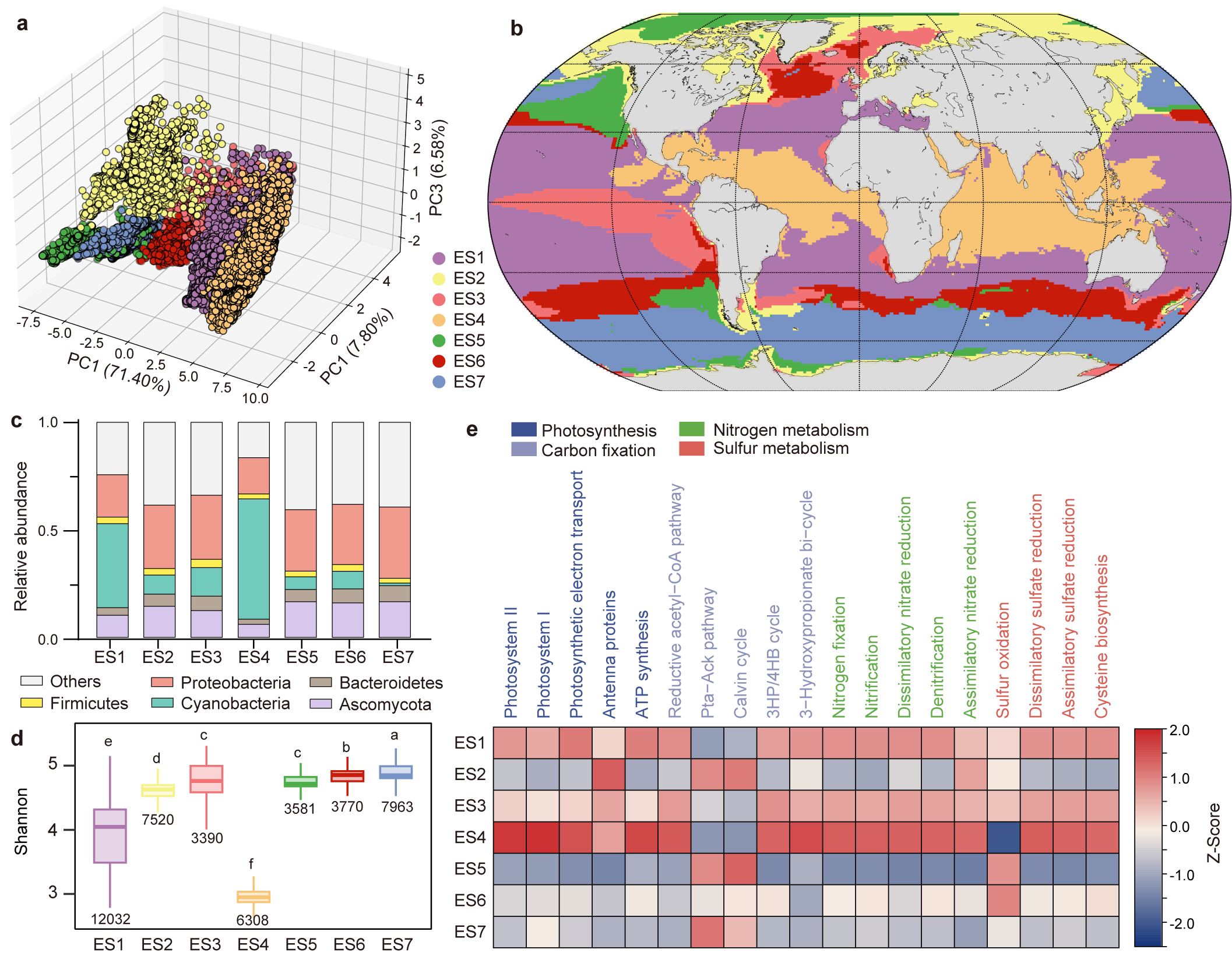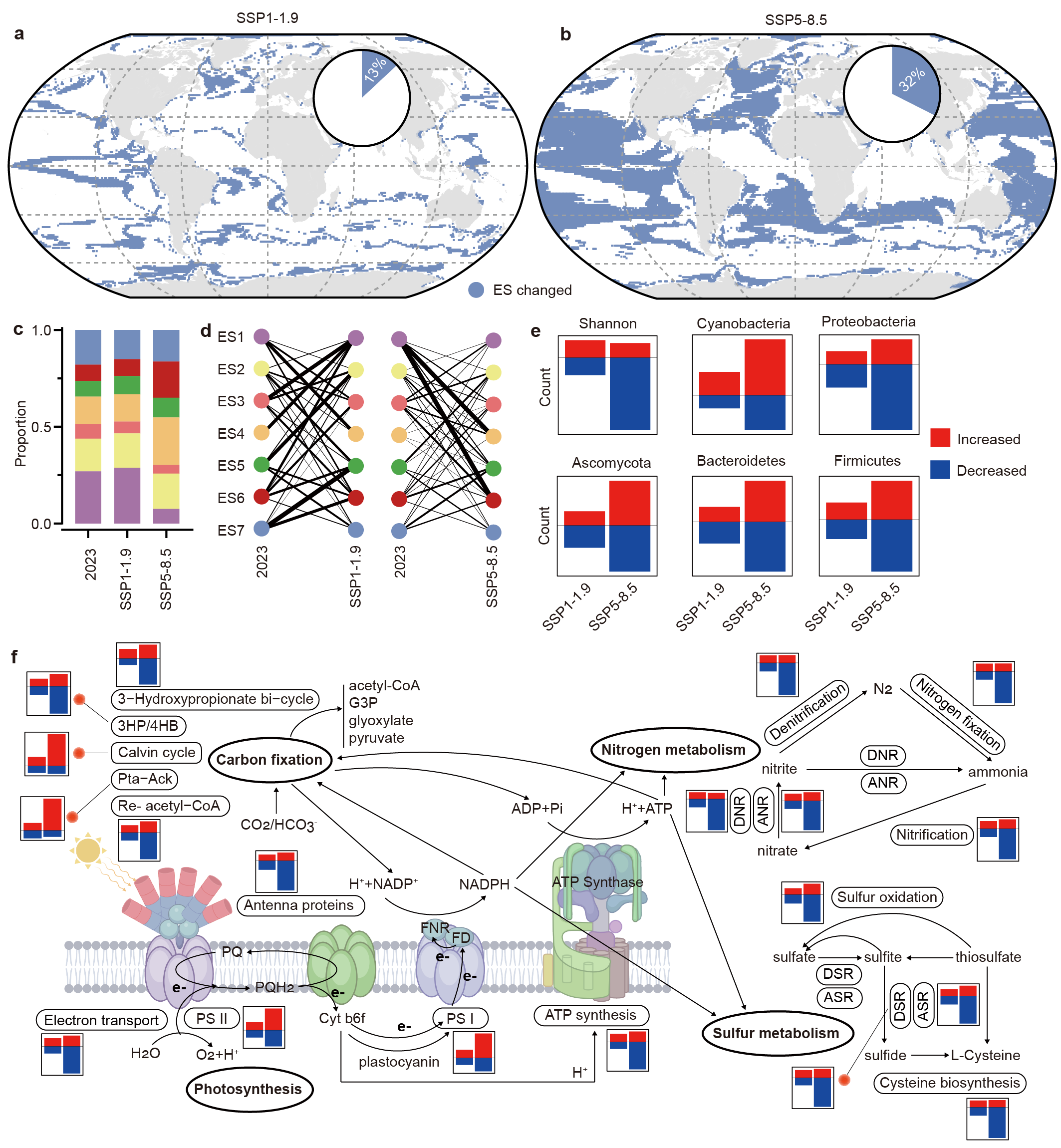Ecological status of future ocean alters under climate change
Published in Earth & Environment, Ecology & Evolution, and Statistics

Big-data analysis is an invaluable technological revolution that can quickly obtain valuable information from massive amounts of data. With the rapid development of gene sequencing technology, the field of microbiology research is ushering in abundant data accumulation and sharing. A large amount of data has driven new research hotspots in multidisciplinary fields such as medicine, agriculture, ecology and biotechnology. Recently, we analysed nearly 1,000 metagenomic samples to assess the biogeographic pattern of the global ocean ecological status under climate change.
Definition of the ecological status of ocean
The ocean accounts for 71% of the Earth's surface and has the richest microbial resources. The total amount of global oceanic microbes is approximately 8 billion tons, which is more than three times that of annual food production. Microbes play important roles in biogeochemical cycles and are important components for assessing the ecological health of the ocean. In this study, we collected 953 metagenomic samples from the global oceanographic research project BIO-GO-SHIP, which involved eight cruises between 2011 and 2020. We revealed the spatiotemporal variations in oceanic microbes and their response to changing environmental conditions. Considering the high correlation between oceanic microbes and environmental factors, we used environmental factors as independent variables and 25 microbial indicators as dependent variables to construct machine learning regression models and predicted the biogeographic patterns of microbes in the surface ocean in 2023. After that, we propose a systemic concept, ecological status, for ocean biogeography by integrating these microbial indicators. The ecological status can be used to evaluate the ecological health of the ocean from the perspectives of microbial diversity, composition and function.

Ecological status alterations in the future ocean
Global climate change is one of the major ecological issues in this century, with far-reaching and complex impacts on the ocean. Our prediction indicated that the ecological status of the surface ocean would change in 32.44% of the ocean area by the end of this century compared to the present level because of changes in environmental conditions under the SSP5-8.5 climate change scenario, which has the highest level of anthropogenic climate change with immoderate fossil fuel development. These changes in ecological status mainly include poleward shifts in the main taxa, increases in photosynthetic carbon fixation and decreases in nutrient metabolism. However, this proportion can decrease significantly with effective control of greenhouse gas emissions. Our study underscores the urgent necessity for implementing policies to mitigate climate change, particularly from an ecological perspective.

Outlook
“The 21st century is the century of biological sciences”, and it is also the century of multidisciplinary cooperation. The rapid growth of gene sequencing, information sharing, and machine learning has greatly accelerated modern microbiology research. Our study revealed the adverse effects of global climate change on ocean health. This comprehensive framework, encompassing ecological status, can be applied to other microbial ecosystems to assess and predict their resistance and resilience in the face of environmental or climate changes.
However, at present, there are still many problems in microbial big--data analysis. First, more public data do not mean more effective data. How to perform scientific analysis on the data from different research projects by eliminating the methodological biases in the experiment, sampling, and sequencing is still a major problem. The dataset used in our study is from BIO-GO-SHIP, an international ocean project that uses standard experimental methods to minimize bias between samples. However, similar international cooperation projects in other habitats are still lacking. In addition, the efficiency of big-data analysis is greatly limited by computing resources, including CPUs, RAM, and GPUs. Taking our project as an example, the downloading, quality control, and database mapping of the original data took half a year on a 256-thread server. Further analysis, including visualization, hierarchical clustering and machine learning, also places greater demands on computing resources. How to effectively integrate computing resources and refine related software/pipelines are important technical issues to be addressed in microbial big-data analysis.
Follow the Topic
-
Nature Communications

An open access, multidisciplinary journal dedicated to publishing high-quality research in all areas of the biological, health, physical, chemical and Earth sciences.
Related Collections
With Collections, you can get published faster and increase your visibility.
Women's Health
Publishing Model: Hybrid
Deadline: Ongoing
Advances in neurodegenerative diseases
Publishing Model: Hybrid
Deadline: Mar 24, 2026



Please sign in or register for FREE
If you are a registered user on Research Communities by Springer Nature, please sign in